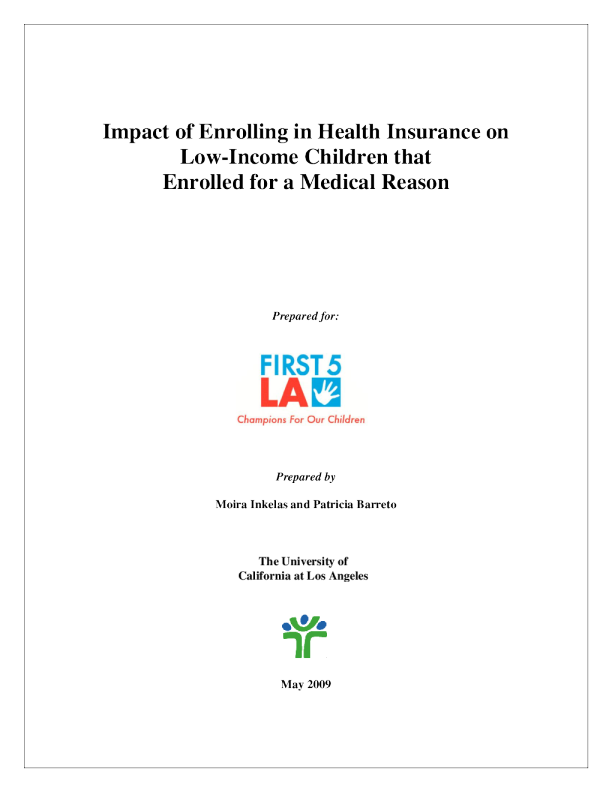The Medical Security System: A Proposal to Ensure Health Insurance Coverage for All Americans

Covering America — Real Remedies for the Uninsured A Robert Wood Johnson Foundation Initiative Preface to Proposals by Urban Institute Researchers By Robert D. Reischauer, President, Urban Institute The recession and rapidly rising health care costs have focussed attention once again on the large number Americans who lack health insurance. Reflecting the renewed interest in the uninsured, a Robert Wood Johnson Foundation initiative, “Covering America,” asked prominent experts with varying perspectives on the problem to systematically analyze options for reducing the number of uninsured. One aim was to develop fundamental and substantial reform plans that were not constrained by what might be viewed to be politically feasible today. Urban Institute researchers developed two of the ten proposals. Expanding Health Insurance Coverage: A New Federal / State Approach One of these, “Expanding Health Insurance Coverage,” a proposal crafted by John Holahan, Len Nichols (now at the Center for Studying Health System Change) and Linda Blumberg, builds on the existing federal/state Medicaid and SCHIP structures but provides more generous federal financing. It recognizes that any successful initiative needs to focus on both those with low incomes and those at risk of incurring high health costs and tailors a subsidy to each of these vulnerable populations. Under this proposal, all residents in a state would be eligible to enroll in coverage offered through state-administered purchasing pools. Participants would never have to pay more than the “state-wide community rate”—the premium that would be charged if all insured individuals in the state were enrolled. (Actual enrollees would have more serious health problems than the average citizen.) Low-income persons enrolling in the purchasing pools would receive premium subsidies in addition to the general subsidy. Individuals wishing to purchase private coverage instead would benefit because the purchasing pools would attract high-cost individuals who previously purchased individual coverage, thus lowering the premiums. The costs of subsidizing the low income and those with higher expected health care costs would be spread across the full population. Any approach to expanding insurance coverage significantly must address three key issues: (1) effectively delivering subsidies that make insurance affordable to low-income persons; (2) navigating the inherently complex ways that the private insurance market pools risk to set premiums; and (3) providing a stable, high quality, and guaranteed source of coverage. The approach suggested by Holahan, Nichols, and Blumberg relies largely on current administrative structures to address these issues. The Medical Security System: A Proposal to Ensure Health Insurance Coverage for All Americans A second proposal, developed by Alan Weil, “The Medical Security System,” would fundamentally reform the nation’s health insurance system. Weil’s approach relies on a payroll tax to fund basic health insurance for all employed people and their dependents. Like the taxes used to finance Social Security and Medicare, the new health payroll tax would be shared between employers and employees. All non-aged Americans would have the right to select from among health insurance options offered through regional health insurance “exchanges.” Using managed competition principles, exchanges would offer plans ranging from no-cost options (that could deliver coverage for no more than the amount they receive through the tax-financing system) to plans that offer better coverage or fewer restrictions but require participants to contribute supplemental premiums. Separate funding sources would cover the costs of the unemployed in the exchanges. In Weil’s approach, large employers could opt out of the tax-financed system if they provided comprehensive coverage to their employees. Thus, this significant part of the existing health insurance system might be left largely intact. Medicaid and the State Children’s Health Insurance Program (SCHIP) would be folded into the larger system, with wrap-around coverage providing enhanced services and a waiver of cost-sharing to the neediest. Medicare would continue to cover the elderly and disabled. Access to Other Proposals The eight other proposals developed for the Robert Wood Johnson Foundation can be accessed through the web site of The Economic and Social Research Institute (ESRI), (www.esreasearch.org) which directed the project. 173Alan R. Weil proposes creating a Medical Security System (MSS) to providehealth insurance coverage to every legal resident under age 65. His plan would:g ua rantee all non-el der ly a mericans access to a basic health coveragepackage at no cost to them, by requiring employers either to provide cover-age or pay a payroll tax to finance coverage purchased through insuranceexchanges.l ic ense h ealth in suranc e e xchan ges designed to organize the insur-ance m




